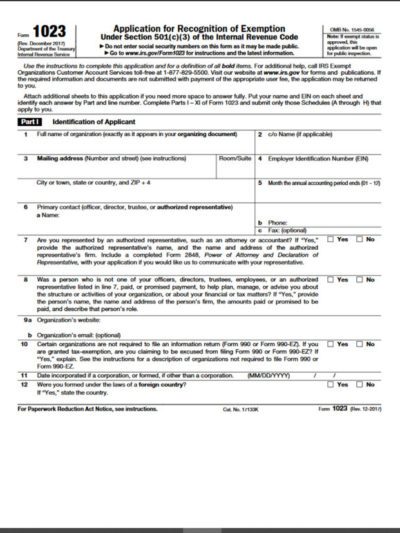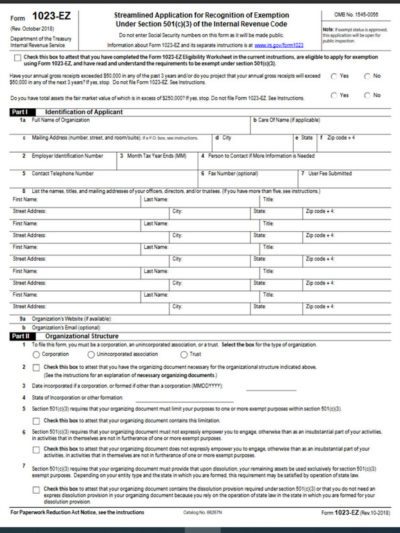What is a Limited Liability Company?
A limited liability company or more commonly referred to as “LLC” is a type of business entity. An LLC is the choice of business entity for most entrepreneurs, investors, and small business owners.
It has gained popularity in recent years because it provides flexibility with taxation and provides strong liability protection for the owners. An LLC is formed by filing the Articles of Organization with the State of Florida and paying a respective filing fee ($125 as of June 30, 2017).
The owners of an LLC are called “members.” The LLC may be managed by its members, or members may appoint “managers” to run the business. The document that governs the owner’s relationship with each other is called an Operating Agreement. The Operating Agreement is similar to a partnership agreement. A good operating agreement should identify each member’s interest in the LLC, how the LLC will be managed, and what happens if there are disagreements.
Technically, all members can partake in managing the company, but smooth business operations normally rely on a centralized organization to ensure good communication and the ability to reach an agreement. You can also designate one or more owners to take on daily operational responsibilities.
If you do not have an operating agreement, your company will be governed by the LLC statute. The LLC Statute provides that if there no operating agreement between the members, each member receives equal profits and losses. The law also provides that without an operating agreement, ownership is determined by the amount of money in each member’s capital account. Further, each member has 100% rights to bind the company to contracts and take actions without the other member’s permissions.
If your LLC is properly formed and properly operated, the members will not be personally liable for LLC’s debts obligations, and liabilities. Florida courts provide strong liability protection to owners of LLC’s. LLC members are not personally liable for the company’s debts or commitments. However, members may still be liable for debts if they personally undertake them. Members are also liable for their own professional malpractice, such as if they are responsible for injuring someone, don’t deposit taxes withheld from employees’ wages or use the company to conduct personal business. Beyond that, members are liable only up to the number of their capital contributions and the amount they agree to contribute to the company’s capital.
Unlike shareholders in a corporation, LLCs are not taxed as a separate business entity. Instead, all profits and losses are “passed through” the business to each member of the LLC. LLC members report profits and losses on their personal federal tax returns, just like the owners of a partnership would.
An LLC’s tax advantages, combined with corporate-style protection from liability, can make it a suitable and cost-effective alternative to other business models. Consult with a Florida Business Lawyer about the best business entity in your situation by clicking here.
Forming and Organizing an LLC in Florida
Forming an LLC gives your business some of the protections that corporations enjoy. It protects you against lawsuits, prevents your business from being over-taxed, and makes your business look more credible. Running your business as an LLC can also reduce the amount of paperwork that you complete each year.
This guide will walk you through the steps required to form and organize an LLC in Florida. If you have any questions about forming an LLC, contact FL Patel Law PLLC at (727) 279 5037.
Initial Considerations
When forming a business, it is important to choose the appropriate business structure. There are many options to choose from including a sole proprietorship, general partnership, S-Corp, C-Corp, and LLC. Each structure has different rules regarding liability, management requirements, and taxation arrangements.
LLCs are one of the most useful types of business structures. It is a flexible arrangement that provides the liability protections of a corporation with the taxation rules of a general partnership. The main advantages of running an LLC include:
- Business owners have limited liability for company debts and lawsuits
- No mandatory annual meetings or minutes (unlike C-Corp and S-Corp)
- An LLC can be owned by another company
- Management of the LLC’s business can be contracted
- Flexibility for allocating profits amongst the company’s members
- An LLC qualifies for pass-through taxation, avoiding double taxation
- Business duration can be perpetual
- Created by state-level legislation
- Profits and losses can be reported on personal tax returns (unlike C-Corp and S-Corp)
- Can have a foreign owner (unlike C-Corp)
- Can have an unlimited number of owners
The disadvantages of choosing an LLC include:
- It can be more difficult to take the company public (compared to a C-Cop or S-Corp).
- An LLC is often more complex than a partnership.
- Equity Compensation and vesting are complicated and expensive.
Name of LLC
Before filing any documents, your business must determine the name of your LLC. In Florida, the naming requirements are as follows:
- The name of the business must include the words “limited liability company” or the abbreviation “L.L.C.” or “LLC”
- Professional LLCs that are formed after 2014 must include the words “professional limited liability company” or the abbreviation “P.L.C.” or “PLLC”
- Your name must be unique and distinguishable from all other entities filed with the Florida Department of State, Division of Corporations (DOC). If your name is similar to another LLC, you can obtain written permission from that business to use the name.
- The name must be used by the LLC with transacting business in Florida, unless an assumed name is adopted.
An LLC’s name is not considered distinguishable when its only difference is:
- The symbol “&” or the word “and”
- The use of a suffix
- A definite/indefinite article
- The plural, singular or possessive version of a word
- Punctuation marks
- An abbreviation of a root word
For example, you could not register a LLC with the name “Coca and Cola” or “Microsoft!”. The name of your LLC should not have language implying or stating that you are affiliated with the government agency. It should not imply that the LLC was organized for a different purpose than the one authorized by the RLLCA and LLC’s articles of organization.
Businesses should research the availability and suitability of LLC names in advance of filing articles of organization to avoid any delays. LLCs in Florida can operate under a fictitious name for a small fee. If you intend to use the name of your LLC as a trademark, trade name, or domain name, searches should be conducted with the US Patent and Trademark Office before applying.
Pre-Formation Logistics
Once your business has settled on a name for the LLC, you should go through the following steps:
- Identifying who the organizer is
The organizer is the individual or business that prepares and files the articles of organization for your LLC. Usually, that will be a qualified lawyer. - The address details of the LLC’s principal office for articles of organization
An address must be specified on the articles of organization. However, a Florida LLC does not require a principal office in Florida. - The address of the LLC’s registered office
This can be the same as the LLC’s place of business. - The registered agent of the LLC
The LLC must continuously have a registered agent. They can either be an individual residing in Florida with the same address and the LLC’s registered office OR a foreign/domestic entity that is authorized to do business in the address assigned to the LLC’s registered office. - Whether the LLC will have an indefinite duration
By default, an LLC will have an indefinite duration, however, your LLC may prefer a specific period of duration. - Whether the LLC renders professional services
Is your LLC for a doctor’s or lawyer’s office? Additional statutory requirements exist for LLCs delivering professional services. - Is the LLC single member or multi-member?
- Is the LLC member-managed or manager-managed?
- Will the LLC be using a long-form or short form operating agreement
Your LLC has the option of using a single operating agreement covering all operations or multiple agreements for different matters - Does the LLC have majority/minority interests?
How will ownership of the LLC be divided?
Articles of Organization
In Florida, the LLC is formed when it has at least one member and the company’s articles of organization have become effective. The articles of organization must be submitted to the Division of Corporations (DOC). The effective time and date can be specified on the filings — if left blank the DOC will provide a time. Counsel usually submits the filing documents online or via mail.
Filing the articles of organization with the DOC attracts a $125 fee. If certified copies of filed articles are required, there is an additional $30 fee. A letter of acknowledgment is issued upon the filing of documents.
Operating Agreement
Any business forming an LLC must have an operating agreement. This document defines:
- The company’s management structure
- How profits are allocated and distributed
- Other agreements and arrangements between members of the LLC
There are some important considerations you should make when preparing these documents, including:
- The rights of each member
Some of the rights that use be spelled out include the member’s rights to profits and losses, their management rights, and voting rights. - Should the LLC have multiple classes of interest?
Will the LLC have members with non-voting interests, non-economic interests, convertible interests, or profit interests? - How will the LLC be managed?
LLCs can be managed by one of the members, or a manager can be brought in. - Initial capital contributions
Who will be contributing initial capital, how much will they contribute and in what form? - Allocation of profits, losses and distributions
How will financial matters be handled within the LLC? - Admission of new members to the LLC
There may have to be rules regarding the admission of new members to the LLC - The dissolution of the LLC
The operating agreement may also include some details on how the LLC should be dissolved.
It is usually a good idea to have a professional help you draft the operating agreement of your LLC.
Initial Acts of The Members
Some LLCs create a resolution that spells out the initial acts required of individual members. This can be useful to get the LLC running quickly. Some of the items that you may include are:
- Setting up bank accounts and account signatories
- Electing officers
- Applying for foreign qualification in other states
- Hiring managers and other staff members
Post-Termination Matters
Finally, you may wish to specify any post-termination matters. This may include the division of assets and dealing with any liabilities that the business has.
Thanking for reading our guide to forming and organizing an LLC in Florida. If you have any questions about forming an LLC, contact FL Patel Law PLLC on (727) 279 5037.
Frequently Asked Questions
Q: What Statute is the Limited Liability Company governed by in Florida?
LLC’s in Florida are governed by the Florida Revised Limited Liability Company Act.
Q: Why are LLCs so common?
LLC’s are the most common legal structure because it provides strong liability protection, there are less record-keeping requirements, and gives you the flexibility to choose the way you get taxed (as sole-proprietorship/partnership or a corporation. It can be used by a single person with a livelihood business or diverse owners for a large and complex business.
Q: What is an Operating Agreement?
An operating agreement is a document that governs your company. It specifies rules regarding ownership, rights and duties of owners, how the company will be managed, duties of the managers, to add or remove members, and so on. Without an operating agreement, your company will be governed by the default rules under the Florida Revised Limited Liability Company Act.
Q: Do you need an Operating Agreement for an LLC in Florida?
The State of Florida does not require your LLC to have an operating agreement. However, it is strongly recommended – especially – if you have multiple owners. The operating agreement structures your LLC’s finances and organization and provides rules and regulations for a smooth operation. The agreement includes a percentage of interest, allocation of profits and losses, owners’ rights and responsibilities and many other important provisions.
Q: How is an LLC managed?
In Florida, LLC’s can be managed by owners (member-manage) or by executives chosen by the owners (manager-manged).
Q: How is an LLC Taxed?
LLC’s can elect to be taxed as pass-through entities such as sole-proprietorship and partnerships or as corporations such as C or S. You need to consult with an accountant and an attorney to determine what the best tax structure for your business is.
Q: What is a Registered Agent and Registered Office
This person is designated by an LLC to receive legal papers that are served on the company. They are called the Registered Agent. The Registered Agent is regularly available at the Registered Office of the company. This office can be company’s offices or the office of another person who is the Registered Agent. What the Registered Agent does is they receive court papers and forward them to all the members of the LLC.
Should I Work With a LLC Formation Attorney?
Starting an LLC in Florida can be a simple process if you hire a proven lawyer to represent you in assembling your documentation.
Begin with a unique and currently unused name to define your business and check URL availability. A Tampa LLC formation lawyer can steer you past the use of restricted and even prohibited words for your company.
At Patel Law, our business attorney will help you file the required Articles of Organization for Florida LLC formation and assist you in drafting your operating agreement. We will advise you to keep your business and personal finances separate by getting an EIN, a business credit card, and registering for state taxes. If you are interested in forming an LLC in Florida, contact us today so we can help ensure it is done right!










Reviews
There are no reviews yet.